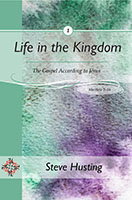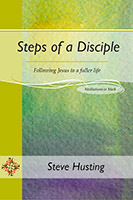I’ve sung several hymns where this point of view is held. The crossing of the river Jordan into Canaan’s land is held to represent death, and the land itself is Heaven. I don’t hold to that view, and I’ll explain why.
Remember when God sent spies into the land to check the land out in Numbers 14? The men returned and said it was a terrible place. Enemies everywhere! “There are giants there,” they said. “Let’s go back to Egypt!” That doesn’t sound like a report of Heaven to me!
Furthermore, after that incident, God had the Israelites turn back to the desert. He told them that only two of them would enter, Joshua and Caleb, because they believed God, while all the rest of the people would die in the wilderness. Only their children would enter the land. Would that then be symbolic of missing Heaven because you thought something bad about it? Multiple problems attend the idea of entering the land as symbolic of entering Heaven.
If it’s not entering Heaven, what does the entrance signify? Hebrews chapters three through four tells how we are to view this defining incident as Christians.
The Israelites heard God say that He was bringing them to a good land flowing with milk and honey; something much better than the slavery of Egypt. One fault the Israelites displayed was disobedience during their wilderness travel toward the Promised Land. “Wherefore (as the Holy Ghost saith, To day if ye will hear his voice, Harden not your hearts, as in the provocation, in the day of temptation in the wilderness” (Heb. 3:7-8). They heard His voice and disobeyed it, turning from the Promised Land. How about us? Do we believe that what God promises us is better than what we have now? Are the promises worth fighting for? The Israelites did not think so, and they perished without receiving God’s best. We too can die without entering the land.
What does that land represent? The land represents a rest to the people of God. “Wherefore I was grieved with that generation, and said, They do alway err in their heart; and they have not known my ways. So I sware in my wrath, They shall not enter into my rest” (Heb. 3:10-11).
There are two ways this rest is defined. On the one hand, it is the same as “partaking,” sharing in all the riches in the coming kingdom with Christ, which is God’s desire for all the saved, but is reserved for those who believe to the end: “For we are made partakers of Christ, if we hold the beginning of our confidence stedfast unto the end” (Heb. 3:14). This treasure is conditional on our faith and obedience.
If we continue in sin and disobedience, then God will reject us for that honor: “And to whom sware he that they should not enter into his rest, but to them that believed not? So we see that they could not enter in because of unbelief” (Heb. 3:18-19). In this passage, the writer makes a strong correlation between believing and obeying. If we are not obeying, we are not really believing. If we are truly believing, then we are following through on the courage of our convictions.
This rest also has a second, present, component, which is resting from the self-striving works that constantly rob us of peace: worries, doubts, fears, envying, lying, lusting, coveting, and so on. Jesus speaks of bringing us to the rest of our souls in Matthew 11:28. It is the same rest. The rest takes place in the soul, in ourselves. “There remaineth therefore a rest to the people of God. For he that is entered into his rest, he also hath ceased from his own works, as God did from his” (Heb. 4:9-10). God rested from His work on the seventh day, and that signified that we can cease from our works; in our case, they would be works of sin and self.
What, then, does the Promised Land represent? It means warfare and triumph over self and sin. Paul told us to “fight the good fight of faith” (1 Tim. 6:12). When the Israelites believed God’s promise that He would fight for them, then that faith gave them the courage to persevere before their enemies until the enemy was wiped out (or until the enemy surrendered to become their slaves). Even so we respond to everything in the Word of God that calls us to change. “Let us labour therefore to enter into that rest, lest any man fall after the same example of unbelief” (Heb. 4:11). Some people in church remain the same year after year while those next to them grow into holiness. Here is why!
We don’t sit around waiting for freedom from sins to happen. We take an active part in it, called sanctification. We fight for the promised land of being more like Christ and reigning with Him when we hear God’s voice speaking to us in the Word about an area we need to work on, a soul enemy, as it were, and confess it. Then the blood of Christ cleanses that part of the land and we hold it for Him. When the enemy rises up against us again, then we fight the good fight of faith to hold it.
In actual experience, this means believing what God says about a persistent sin in your life, or poor conduct with others, or a bad habit of thought, word, or conduct that dishonors God. When we truly believe God for the sin, we come and ask for His forgiveness, and the blood washes away the sin. Then we also ask for help to stand against that sin, and take a promise from God that He will help us. This is war in the Promised Land. It is beautifully exemplified in the final verses of Hebrews four:
“For the word of God is quick, and powerful, and sharper than any twoedged sword, piercing even to the dividing asunder of soul and spirit, and of the joints and marrow, and is a discerner of the thoughts and intents of the heart. Neither is there any creature that is not manifest in his sight: but all things are naked and opened unto the eyes of him with whom we have to do.
“Seeing then that we have a great high priest, that is passed into the heavens, Jesus the Son of God, let us hold fast our profession. For we have not an high priest which cannot be touched with the feeling of our infirmities; but was in all points tempted like as we are, yet without sin.
“Let us therefore come boldly unto the throne of grace, that we may obtain mercy, and find grace to help in time of need” (Heb. 4:12-16).
Many Christians do not advance in their walk because they do not fight. They do not understand the implications of what it means to have faith. If you believe that God will fight for you until you triumph over that sin, then you will keep up the war against that sin until you win.
Jesus came to save us from our sins. If we do not deal with sin, then we are not participating in God’s work of salvation. We are saying that the Son’s death on the cross is not important to our lives. “But exhort one another daily, while it is called To day; lest any of you be hardened through the deceitfulness of sin” (Heb. 3:13). In Heaven we will stand before God to answer for how we lived; we will be rewarded for a faith that showed itself in obedience. We won’t be rewarded for a mind that merely agreed with what the Bible says, but did not follow through to line up our lives with its teaching.
Although God saves us when we put our trust in Christ, we don’t experience the fuller benefits of that salvation in the present until we respond to God in love and obedience. Jesus came to bring us to rest. We need to accept the yoke put upon us (Matt. 11:28-30), which is learning of Him and ceasing from our striving works to just trust Him. It will be a struggle to believe; we will fight as long as we believe His promise.
The Promised Land of life and that more abundantly is a promise from a God who cannot lie. But the promise won’t be active in our lives until we believe it and act upon it. (That’s very different from the way we use promises today. “I promise I’ll mow the lawn tomorrow.” No one needs to believe it for it to happen; we just assume the person should do what he says he will do.) Every day we must decide: do I believe God has a better life for me, or do I continue in my slavery to self and sin? Do I want a closer walk with God, or the “fleshpots of Egypt”?
God promises that He will fight for us. He will drive out the enemy little by little. He also tells us as he told Joshua in Joshua 1:2-9:
“Moses my servant is dead; now therefore arise, go over this Jordan, thou, and all this people, unto the land which I do give to them, even to the children of Israel.
“Every place that the sole of your foot shall tread upon, that have I given unto you, as I said unto Moses. From the wilderness and this Lebanon even unto the great river, the river Euphrates, all the land of the Hittites, and unto the great sea toward the going down of the sun, shall be your coast.
There shall not any man be able to stand before thee all the days of thy life: as I was with Moses, so I will be with thee: I will not fail thee, nor forsake thee. Be strong and of a good courage: for unto this people shalt thou divide for an inheritance the land, which I sware unto their fathers to give them. Only be thou strong and very courageous, that thou mayest observe to do according to all the law, which Moses my servant commanded thee: turn not from it to the right hand or to the left, that thou mayest prosper whithersoever thou goest.
“This book of the law shall not depart out of thy mouth; but thou shalt meditate therein day and night, that thou mayest observe to do according to all that is written therein: for then thou shalt make thy way prosperous, and then thou shalt have good success.
“Have not I commanded thee? Be strong and of a good courage; be not afraid, neither be thou dismayed: for the Lord thy God is with thee whithersoever thou goest.”







Googled something about what the Promised Land means to Christians today, and so stumbled upon your website. Enjoyed reading your post, and noticed you are a published author. I’m a would-be author and would be interested in any advice you might have about writing or getting published or anything at all. I am writing a final chapter for a book, a series of books, about Christian help and guidance incidentally. Please visit my blog, and leave a message if so inclined.